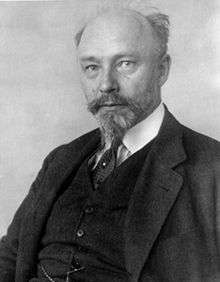Hermann von Keyserling
| Hermann Graf Keyserling | |
|---|---|
 | |
| Born | July 20, 1880 |
| Died | April 26, 1946 (aged 65) |
| Era | 20th-century philosophy |
| Region | Western philosophy |
Count Hermann Alexander von Keyserling (July 20, 1880 – April 26, 1946) was a Baltic German philosopher from the Keyserlingk family. His grandfather Alexander Keyserling was a notable geologist of Imperial Russia.
Life
He was born to a wealthy aristocratic family in the Kõnnu Manor, Pärnu County in Governorate of Livonia, Russian Empire, now in Estonia. After his education at the universities of Dorpat (Tartu), Heidelberg, and Vienna, he took a trip around the world. He married Maria Goedela von Bismarck-Schönhausen, granddaughter of Otto von Bismarck. His son Arnold Keyserling followed his fathers footsteps and became a renowned philosopher.
Hermann Keyserling interested himself in natural science and in philosophy, and before World War I he was known both as a student of geology and as a popular essayist. The Russian Revolution deprived him of his estate in Livonia, and with the remains of his fortune he founded the Gesellschaft für Freie Philosophie (Society for Free Philosophy) at Darmstadt. The mission of this school was to bring about the intellectual reorientation of Germany.[1]
He was the first to use the term Führerprinzip. One of Keyserling's central claims was that certain "gifted individuals" were "born to rule" on the basis of Social Darwinism.
Although not a doctrinaire pacifist, Keyserling believed that the old German policy of militarism was dead for all time and that Germany's only hope lay in the adoption of international, democratic principles. His best-known work is the Reisetagebuch eines Philosophen ("Travel-journal of a Philosopher"). The book also describes his travels in Asia, America and Southern Europe.
Works
- Reisetagebuch eines Philosophen
- Das Buch vom Ursprung
- Schöpferische Erkenntnis
- Südamerikanische Meditationen
- Einführung in die Schule der Weisheit
- Philosophie als Kunst
- Das Buch vom persönlichen Leben
- Betrachtungen der Stille und Besinnlichkeit
- Reise durch die Zeit (Memoiren)
- Das Spektrum Europas
- Das Gefüge der Welt: Versuch einer kritischen Philosophie
Literature
- Dyserinck, Hugo: Graf Hermann Keyserling und Frankreich, Ein Kapitel deutsch-französischer Geistesbeziehungen im 20. Jahrhundert; Bouvier, Bonn 1970; ISBN 3-416-00667-4
- Gahlings, Ute: Hermann Graf Keyserling, ein Lebensbild; Justus-von-Liebig-Verlag, Darmstadt 1996; ISBN 3-87390-116-1
- Keyserling-Archiv Innsbruck-Mühlau (Hrsg.): Graf Hermann Keyserling, ein Gedächtnisbuch; Rohrer, Innsbruck 1948
- Kaminsky, Amy: ' Victoria Ocampo and the Keyserling Effect' in Argentina, Stories for a Nation, (Minneapolis: University of Minnesota Press, 2008) p. 70-98.
References
External links
| Wikiquote has quotations related to: Hermann von Keyserling |
- Works by or about Hermann von Keyserling at Internet Archive
- ULB Darmstadt at elib.tu-darmstadt.de
- Count Hermann Keyserling at www.schoolofwisdom.com
- Schule der Weisheit at schuledesrades.org (German online Books)
- THE WEBSITE OF Stammbaum der Grafen und Barone Keyserlingk at www.keyserlingk.info
- Newspaper clippings about Hermann von Keyserling in the 20th Century Press Archives of the German National Library of Economics (ZBW)